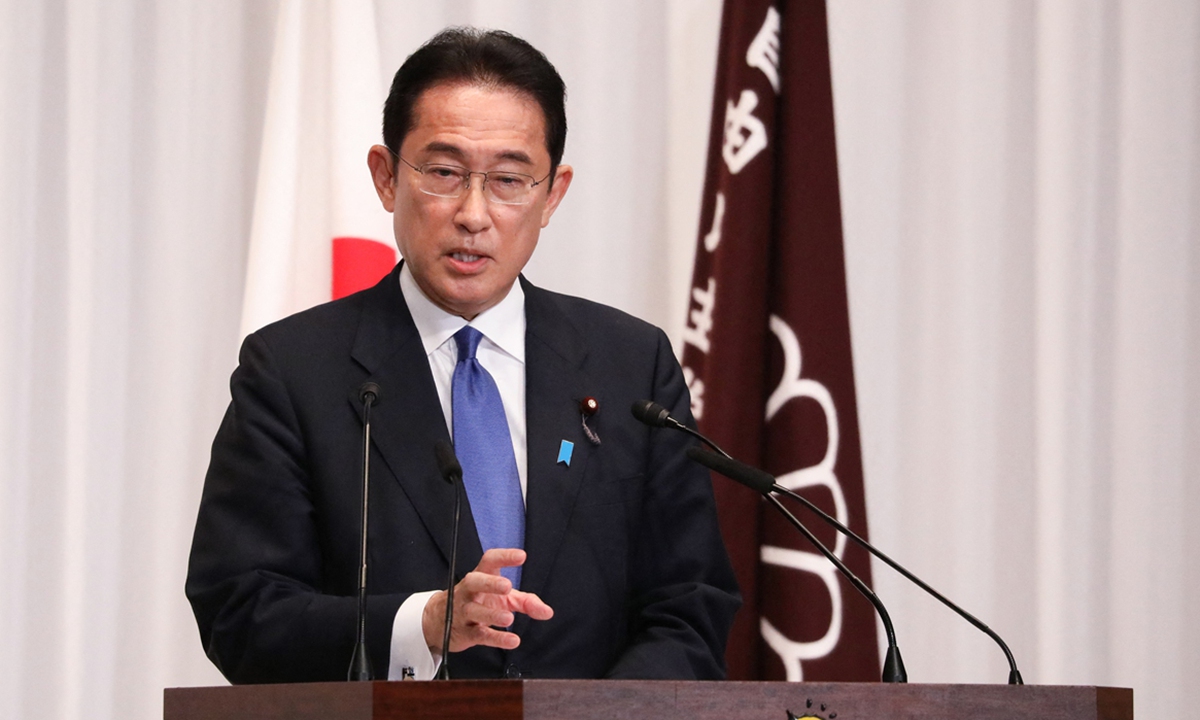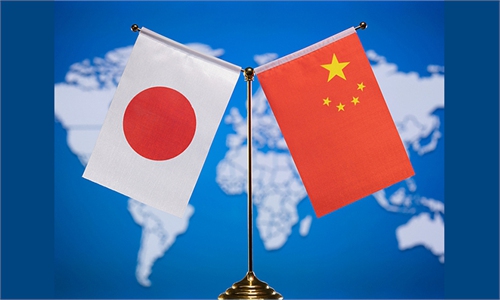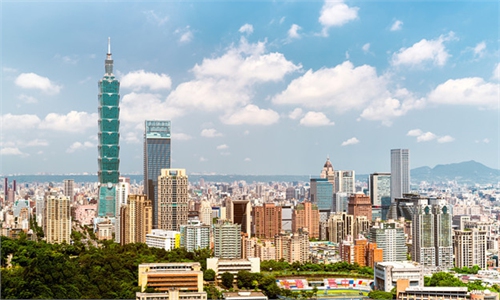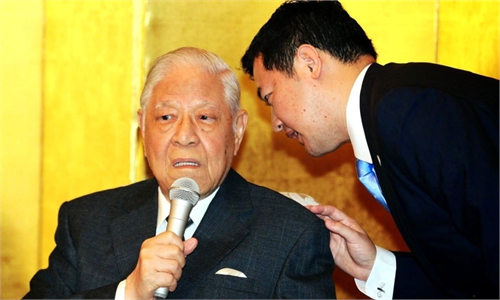
Fumio Kishida File Photo:AFP
Japanese Prime Minister Fumio Kishida is set to deliver a keynote speech at the Shangri-La Dialogue in Singapore on Friday, during which he will reportedly use Russia-Ukraine conflict as an example to oppose unilateral changes to the status quo by force and unveil a plan to raise Japan's defense budget, three days after Japan agreed to step up military ties with NATO due to concerns of the Russia-Ukraine conflict and extended an olive branch to NATO's involvement in the Asia-Pacific region.
Chinese analysts believed that Japan is now using the Russia-Ukraine crisis to strengthen its military cooperation with NATO, and trying to channel NATO's influence into the Asia-Pacific region or promote the establishment of a NATO-like military alliance in the region, and such ill-intended plans actually hijacked regional peace and stability to serve its ambition of strengthening its military power, containing China with a military alliance, and getting rid of the constraints of its Pacifist Constitution.
Japan uses the pretext of "preventing a crisis like the Russia-Ukraine crisis from happening in Asia" to legitimize its move to collude with NATO and to convince regional countries to serve its goal of targeting China, but in fact, the expansion of NATO is the root cause of the ongoing conflict in Ukraine, so if a NATO-like military organization emerges in Asia, the region would come much closer to a military crisis, said experts.
Tokyo's selfish and dangerous attempt is unlikely to succeed, as China and other peace-loving regional countries will work together to keep the region away from the regional militarization and confrontation which is happening in Europe, Chinese analysts noted.
Japan's ambition
Japanese Prime Minister Fumio Kishida is set to present his country's vision for a more secure Asia-Pacific region through maritime cooperation with 20 or more nations when he speaks at the Shangri-La security dialogue on Friday in Singapore, government sources said, according to Kyodo News on Thursday.
Noting that the status quo "has already been changed by force in the East and South China Seas," Kishida is expected to convey his plan to assist Asia-Pacific nations by providing patrol boats and constructing maritime transport infrastructure while investing in the necessary human resources.
He is set to call for efforts to "prevent a crisis similar to that in Ukraine from arising in the Indo-Pacific as well as underscoring the importance of peace and stability across the Taiwan Straits."
In fact, Japan is not trying to safeguard regional peace and stability, but to create tensions and trouble by hyping the "China threat theory" so that Japan can legitimize its ambition to develop military force and push for an amendment of its Pacifist Constitution, Lü Yaodong, a research fellow with the Institute of Japanese Studies under the Chinese Academy of Social Sciences, said on Thursday.
If Asia remains peaceful and stable, Tokyo won't have an excuse to break the limitations of its constitution, get rid of US control and become a normalized country, said analysts, noting that it's not just simply serving the US, but using the current situation in Ukraine and the US Indo-Pacific strategy to realize its own ambitions by creating tensions in the region, Lü noted.
On Tuesday, Japanese and NATO officials agreed to step up military cooperation and joint exercises over shared concerns that the Russia-Ukraine conflict is "causing a deterioration of the security environment in Europe and Asia," the Associated Press reported.
Japanese Defense Minister Nobuo Kishi said at the beginning of his meeting with NATO Military Committee chief Rob Bauer that Japan hopes to strengthen its ties with European countries and welcomes NATO's expanded involvement in the Asia-Pacific region, the report said.
"The security of Europe and Asia are closely intertwined, especially now with the international community facing serious challenges," Kishi said. Bauer's visit to Tokyo comes as Japan's Maritime Self Defense Force participates in NATO naval exercises in the Mediterranean Sea, according to the report.
This kind of collusion between Japan and NATO under the pretext of security will be of no help in preventing conflicts, but could seriously damage regional peace and increase uncertainties, said analysts.
Liu Jiangyong, vice dean of the Institute of Modern International Relations at Tsinghua University, told the Global Times on Thursday that Japan's move to introduce NATO's influence into Asia or push for the establishment of an Asia-Pacific version of NATO "will bring danger not only to China but also the whole Asia-Pacific region."
"Firstly, Japan will strengthen its military power, and as a country that has been defeated by the allies in World War II, Japan could finally realize a military rise; secondly, Asia would experience tensions like those in Europe caused by NATO expansion; thirdly, it will bring obstacles to the process of China's reunification, and even send a wrong signal to encourage Taiwan secessionists; moreover, Japan would increase pressure to target China's law-enforcement over the Diaoyu Islands," Liu noted.
Currently, due to the constraints imposed by its Pacifist Constitution, Japan cannot join NATO, but it is possible for it to amend relevant articles and then apply for NATO membership, which would make NATO a global military bloc not only with influence in Europe, but one that enables the US and Japan to build a new military alliance to seriously threaten China's development and security, Liu said.
Stopping a dangerous trend
China opposes some forces using the Ukraine crisis as an excuse to advocate NATO's further expansion into the Asia-Pacific region, said Chinese State Councilor and Foreign Minister Wang Yi on May 13 during a phone conversation with Greek Foreign Minister Nikos Dendias. The two sides exchanged views on the Ukrainian situation and bilateral relations.
Attempts to create an "Asia-Pacific version of NATO" will only do serious harm to regional security, Wang said.
Song Zhongping, a military expert and TV commentator, told the Global Times on Thursday that although Japan has ambitions to push the establishment of an Asia-Pacific version of NATO, Asia is not Europe, and doesn't really have the conditions for building a military alliance like NATO.
"Most Asian countries, even those aligned with the US like South Korea and the Philippines, do not see China as their enemy or a threat, because China is their biggest trade partner and these countries enjoy concrete benefits from their stable ties with China," Song noted.
After some frictions in the past few years on issues such as the South China Sea and the THAAD crisis, most countries in the region have already learned that serving a US strategy to contain and provoke China brings nothing good but only losses and pressure, and they also realized that having stable and friendly relations with China is significant to their national interests, so Asian countries don't share the same thinking as Japan and don't want to be China's enemy, said analysts.
Japan has decided to hijack the whole region, and is even inviting NATO to step into the Asia-Pacific region to contain China, and what China needs to do is to strengthen its ties with the regional countries to build a community of shared future and reach a consensus with peace-loving countries in Asia, Song said.
"China's development is not a threat to Asia, but a certainty for peace and prosperity of the continent," Song said, noting that "in other words, whoever challenges China's development and sovereignty is challenging regional peace and stability."
Furthermore, China needs to strengthen its capabilities in all aspects, including the economy and military, to effectively deter all provocations that target China's core interests, and to isolate and effectively and overwhelmingly defeat the hostile forces that try to challenge and harm China's sovereignty and national security, to minimize the impact on regional peace and stability, Song noted.




